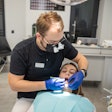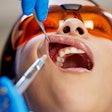Combining antidepressants with treatments like oral appliances may help relieve pain and improve function in patients with a chronic temporomandibular disorder (TMD), according to a review recently published in the Journal of Oral Rehabilitation.
However, further research is needed to better understand how these combined therapies can help these patients, the authors wrote.
"Antidepressants, particularly when combined with non-pharmacological treatments, may enhance pain relief and functional outcomes for chronic TMD pain," wrote the authors, led by Takara Dei of the University of Alberta Faculty of Pharmacy and Pharmaceutical Sciences in Canada (J Oral Rehabil, April 4, 2025).
This systematic review analyzed randomized controlled trials (RCTs) on the use of antidepressants for chronic TMD pain in adults, focusing on pain relief and functional improvement. A search was conducted of multiple databases up to April 2024 and included seven RCTs with 12 to 80 adult participants each, all experiencing TMD pain for at least three months, they wrote.
The studies examined antidepressants such as amitriptyline, duloxetine, nortriptyline, and citalopram used alone or alongside nondrug therapies, including arthrocentesis, oral appliances, or trigger point injections.
Combining medications like duloxetine with procedures such as arthrocentesis consistently improved both pain and function more than the procedure alone. Similarly, amitriptyline showed notable benefits, particularly when used with oral appliances, while nortriptyline paired with gabapentin significantly reduced pain and muscle tenderness. However, citalopram was less effective, showing no clear advantage over control treatments, they wrote.
Although combination therapies generally produced better outcomes, results for antidepressants used alone were mixed. Side effects, including gastrointestinal issues, high blood pressure, and drowsiness, were more common, particularly with duloxetine, than with placebo or monotherapies.
Nevertheless, the review had limitations. Most of the studies included had small sample sizes, potentially limiting the reliability and generalizability of the results, the authors added.
"Despite these limitations, the review provides valuable insights into the potential role of antidepressants in chronic TMD pain management and underscores the need for high-quality, standardised studies to better inform clinical practice," they wrote.




















